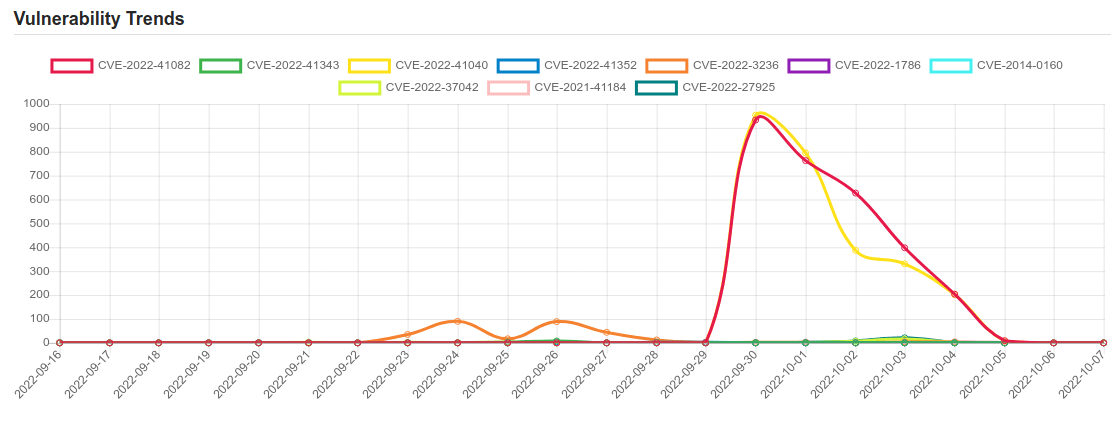Daily Vulnerability Trends: Sat Oct 08 2022

| CVE NAME | CVE Description |
| CVE-2014-0160 | The (1) TLS and (2) DTLS implementations in OpenSSL 1.0.1 before 1.0.1g do not properly handle Heartbeat Extension packets, which allows remote attackers to obtain sensitive information from process memory via crafted packets that trigger a buffer over-read, as demonstrated by reading private keys, related to d1_both.c and t1_lib.c, aka the Heartbleed bug. CVSS V2 scoring evaluates the impact of the vulnerability on the host where the vulnerability is located. When evaluating the impact of this vulnerability to your organization, take into account the nature of the data that is being protected and act according to your organization’s risk acceptance. While CVE-2014-0160 does not allow unrestricted access to memory on the targeted host, a successful exploit does leak information from memory locations which have the potential to contain particularly sensitive information, e.g., cryptographic keys and passwords. Theft of this information could enable other attacks on the information system, the impact of which would depend on the sensitivity of the data and functions of that system. |
| CVE-2015-1194 | pax 1:20140703 allows remote attackers to write to arbitrary files via a symlink attack in an archive. |
| CVE-2022-20409 | No description provided |
| CVE-2022-37042 | Zimbra Collaboration Suite (ZCS) 8.8.15 and 9.0 has mboximport functionality that receives a ZIP archive and extracts files from it. By bypassing authentication (i.e., not having an authtoken), an attacker can upload arbitrary files to the system, leading to directory traversal and remote code execution. NOTE: this issue exists because of an incomplete fix for CVE-2022-27925. |
| CVE-2021-41184 | jQuery-UI is the official jQuery user interface library. Prior to version 1.13.0, accepting the value of the `of` option of the `.position()` util from untrusted sources may execute untrusted code. The issue is fixed in jQuery UI 1.13.0. Any string value passed to the `of` option is now treated as a CSS selector. A workaround is to not accept the value of the `of` option from untrusted sources. |
| CVE-2022-27925 | Zimbra Collaboration (aka ZCS) 8.8.15 and 9.0 has mboximport functionality that receives a ZIP archive and extracts files from it. An authenticated user with administrator rights has the ability to upload arbitrary files to the system, leading to directory traversal. |
| CVE-2022-27924 | Zimbra Collaboration (aka ZCS) 8.8.15 and 9.0 allows an unauthenticated attacker to inject arbitrary memcache commands into a targeted instance. These memcache commands becomes unescaped, causing an overwrite of arbitrary cached entries. |
| CVE-2016-7103 | Cross-site scripting (XSS) vulnerability in jQuery UI before 1.12.0 might allow remote attackers to inject arbitrary web script or HTML via the closeText parameter of the dialog function. |
| CVE-2010-5312 | Cross-site scripting (XSS) vulnerability in jquery.ui.dialog.js in the Dialog widget in jQuery UI before 1.10.0 allows remote attackers to inject arbitrary web script or HTML via the title option. |
| CVE-2020-13379 | The avatar feature in Grafana 3.0.1 through 7.0.1 has an SSRF Incorrect Access Control issue. This vulnerability allows any unauthenticated user/client to make Grafana send HTTP requests to any URL and return its result to the user/client. This can be used to gain information about the network that Grafana is running on. Furthermore, passing invalid URL objects could be used for DOS’ing Grafana via SegFault. |
| CVE-2012-6662 | Cross-site scripting (XSS) vulnerability in the default content option in jquery.ui.tooltip.js in the Tooltip widget in jQuery UI before 1.10.0 allows remote attackers to inject arbitrary web script or HTML via the title attribute, which is not properly handled in the autocomplete combo box demo. |
| CVE-2022-31680 | No description provided |
| CVE-2022-41082 | No description provided |
| CVE-2022-41343 | registerFont in FontMetrics.php in Dompdf before 2.0.1 allows remote file inclusion because a URI validation failure does not halt font registration, as demonstrated by a @font-face rule. |
| CVE-2022-41040 | No description provided |
| CVE-2022-41352 | An issue was discovered in Zimbra Collaboration (ZCS) 8.8.15 and 9.0. An attacker can upload arbitrary files through amavisd via a cpio loophole (extraction to /opt/zimbra/jetty/webapps/zimbra/public) that can lead to incorrect access to any other user accounts. Zimbra recommends pax over cpio. Also, pax is in the prerequisites of Zimbra on Ubuntu; however, pax is no longer part of a default Red Hat installation after RHEL 6 (or CentOS 6). Once pax is installed, amavisd automatically prefers it over cpio. |
| CVE-2022-40684 | No description provided |
| CVE-2022-3236 | A code injection vulnerability in the User Portal and Webadmin allows a remote attacker to execute code in Sophos Firewall version v19.0 MR1 and older. |
| CVE-2022-25748 | No description provided |
| CVE-2022-1786 | A use-after-free flaw was found in the Linux kernel’s io_uring subsystem in the way a user sets up a ring with IORING_SETUP_IOPOLL with more than one task completing submissions on this ring. This flaw allows a local user to crash or escalate their privileges on the system. |
A considerable amount of time and effort goes into maintaining this website, creating backend automation and creating new features and content for you to make actionable intelligence decisions. Everyone that supports the site helps enable new functionality.
If you like the site, please support us on Patreon using the button below

To keep up to date follow us on the below channels.




![Cobalt Strike Beacon Detected - 179[.]43[.]186[.]234:80 6 Cobalt-Strike](https://www.redpacketsecurity.com/wp-content/uploads/2021/11/Cobalt-Strike-300x201.jpg)
![[PLAY] - Ransomware Victim: All Book Covers 7 image](https://www.redpacketsecurity.com/wp-content/uploads/2024/09/image-300x300.png)